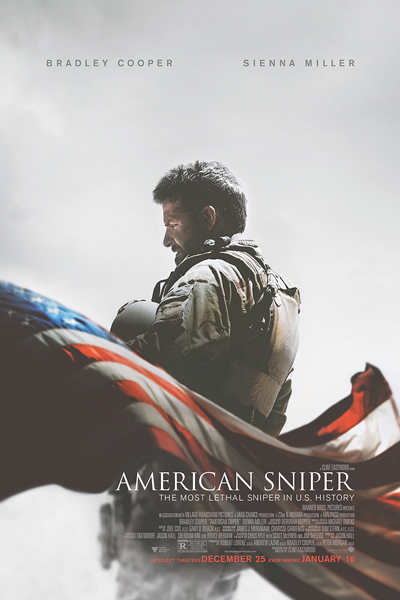American Sniper
- 2 Jul 2015
- This biopic does enough to stand out in a genre that's getting tired. Like the non-fiction book, the movie follows Chris Kyle while he thrives as a Navy SEAL at war and then as he struggles as a family man at home.

I listened to the audiobook a few years ago, while the traditional book was still on the New York Times Best Sellers list and, frankly, while Chris Kyle was still alive. I borrowed the audiobook from a library where the waitlists for all copies and all versions were lengthy. The aura and hype of Kyle being “the most lethal sniper in US military history” obviously had wide appeal, at least among men.
The audiobook was narrated by an actor who predictably used a thick West Texas accent to mimic the guy whose life provided the story. The narrator’s contrived accent was distracting at first, but I could focus on the message of the words instead of their delivery. The book was an honest reflection from an unassuming man who was unapologetic about his experiences, but he was sharply aware of their effects on him and others.
The movie strays from the book in notable ways, but these two works are the same in the most important way. Kyle becoming famous as a prolific Navy SEAL sniper in Iraq is just one side of the coin; the other side is him dealing with the consequences that his multiple deployments have on his well-being and his family. Kyle is, quite fairly, portrayed as being a true believer in his duty to protect his country and countrymen.
The scenes that stand out to me are encounters with Chris’s younger brother Jeff at an airfield in Iraq and Chris’s SEAL teammate comparing war to a self-destructive game from his youth. In both cases, Chris is stunned by his fellow warfighters candidly revealing that they really don’t want to be there. Chris never says that he wants to leave, at least not until the climactic battle, but he’s clearly unsettled by his peers not sharing his steadfast belief.
Bradley Cooper looks like the real Chris Kyle, both in terms of build and beard. I remember the book describing the baseball cap and bullet holster that Cooper sports in the movie. Cooper’s accent is more distracting than that of the audiobook narrator, though. It’s not bad, it’s just too much, especially after listening to the real deal.
The scene in which Chris meets his future wife Taya, played by Sienna Miller, is awkward to watch, but I’m not sure who to blame. The actors? The writers? Clint Eastwood, even? In any case, I remembered Chris noting in the book that Taya was wearing leather pants when they first met. This trivial detail is mentioned in the movie.
Since watching it, I’ve learned that The Butcher and Mustafa are fictional. My being convinced that they had existed is partly a testament to the plausibility of the script and partly a result of three years passing since I’ve listened to the audiobook. The same is true for the movie deaths of Chris’s SEAL teammates; I hadn’t expected either of them to die, though I might’ve been confused by the autobiography of fellow SEAL sniper Marcus Luttrell.
The movie ends with the somber scene of Chris leaving his family for a fateful trip with a troubled ex-Marine. The movie is unflinching in its depiction of violence, at least in Iraq, but thankfully Clint Eastwood doesn’t show the killings of Chris and his friend Chad Littlefield at the hands of a stranger whom they were trying to befriend. Footage of the real Chris Kyle’s funeral procession and ceremony are shown with the credits.
I’ve always been drawn to war stories in print and on film, but I’m starting to get tired of them. Still, I would recommend American Sniper to anyone who’s in the same situation as me because of the movie’s earnest attempt to show both sides of that proverbial coin.